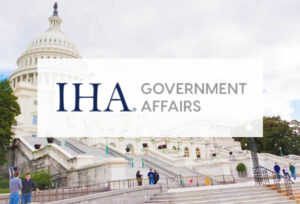The U.S. Trade Representative (USTR) is required by statute to conduct a “necessity review” of Section 301 tariffs, which in this case concern tariffs placed on some $300-$350 billion of products from China (Lists 1, 2, 3 and 4a). Former President Donald Trump started imposing the duties in 2018 under Sec. 301 of the Trade Act of 1974, which automatically expire after four…
CONTINUE READING
Government Affairs & Legal
IHA has collected a variety of resources to help members stay on top of current legal and technology issues.
Labor Relations Regulatory Update
The Biden Administration’s regulatory agenda will face Republican scrutiny in the next Congress by way of oversight hearings and a stream of information requests to agency heads between hearings from committee chairs. Administration proposals concerning labor (employee) relations will be one of the more controversial areas based on Republican concerns that they will create more…
CONTINUE READINGTariff Update
In early September, the U.S. Trade Representative (USTR) announced it had received comments from a number of entities supporting a continuation of the Section 301 tariffs on products produced in China. This culminates the first phase of USTR’s statutorily mandated “review of necessity” for Sec. 301 tariffs before they expire after four years. However, by September’s end, USTR…
CONTINUE READINGFederal Spending, Taxes, Inflation and Interest Rates
According to many economists, a major contributor to inflation in the U.S. economy is federal spending. Congress had already spent $3 trillion in 2020 responding to the pandemic when Democrats took the reins and passed the $1.9 trillion American Rescue Plan in March 2021. This was done despite warnings from economists including former Obama officials who feared more big…
CONTINUE READINGSupply Chain Variables Cloud the Future
The Ocean Shipping Reform Act of 2022 (OSRA22, S. 3580) signed on June 16 by President Joe Biden is a major step toward fixing supply chain problems that involve ocean carrier practices. An immediate benefit for trucking firms and shippers is that OSRA now requires 13 specific items of information on carriers’ invoices and failure to include such information relieves the need…
CONTINUE READINGTwo Important Trade Developments
On June 16, President Joe Biden signed the Ocean Shipping Reform Act of 2022 (OSRA22, S. 3580) into law. This followed the House’s June 13 passage of the Senate version 369-42 in response to White House pressure for House Democrats to accept the Senate bill and quickly get a much-needed victory to the President’s desk. This rare and meaningful bipartisan achievement will…
CONTINUE READINGUSTR China Tariff Review Process Underway
As required by law, the U.S. Trade Representative (USTR) announced May 3 that it has initiated a four-year “review of necessity” process for tariffs on Chinese imports under Sec. 301 of the Trade Act of 1974. In a May 10 speech, President Joe Biden said combating inflation is his top domestic priority citing the pandemic, supply chain issues and war in Ukraine as the primary…
CONTINUE READINGThe Ocean Shipping Reform Act goes to a House-Senate Conference
Key to untying the Gordian knot known as the supply-chain crisis is recognizing and addressing unreasonable business practices by ocean carriers. Some of these practices can likely be attributed to consolidation, and a recent report by Commissioner Carl Bentzel, Federal Maritime Commission (FMC), finds the shipping container (“containerization”) was a key factor in this…
CONTINUE READINGChina Competition Legislation
Perhaps the last big initiative that has a chance to be agreed to by both chambers of Congress before the midterm election usurps the agenda is “China competition legislation.” The Senate and House have approved two separate bills per this broad theme, with the anchor provision in each being $52 billion to incentivize companies to build semiconductor manufacturing facilities…
CONTINUE READING- « Previous Page
- 1
- 2
- 3
- 4
- 5
- …
- 8
- Next Page »



